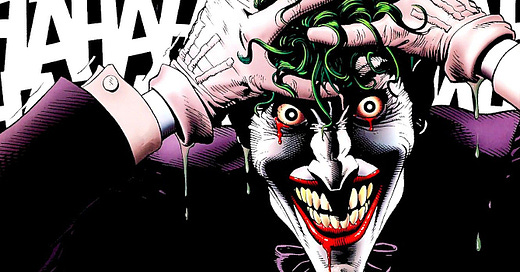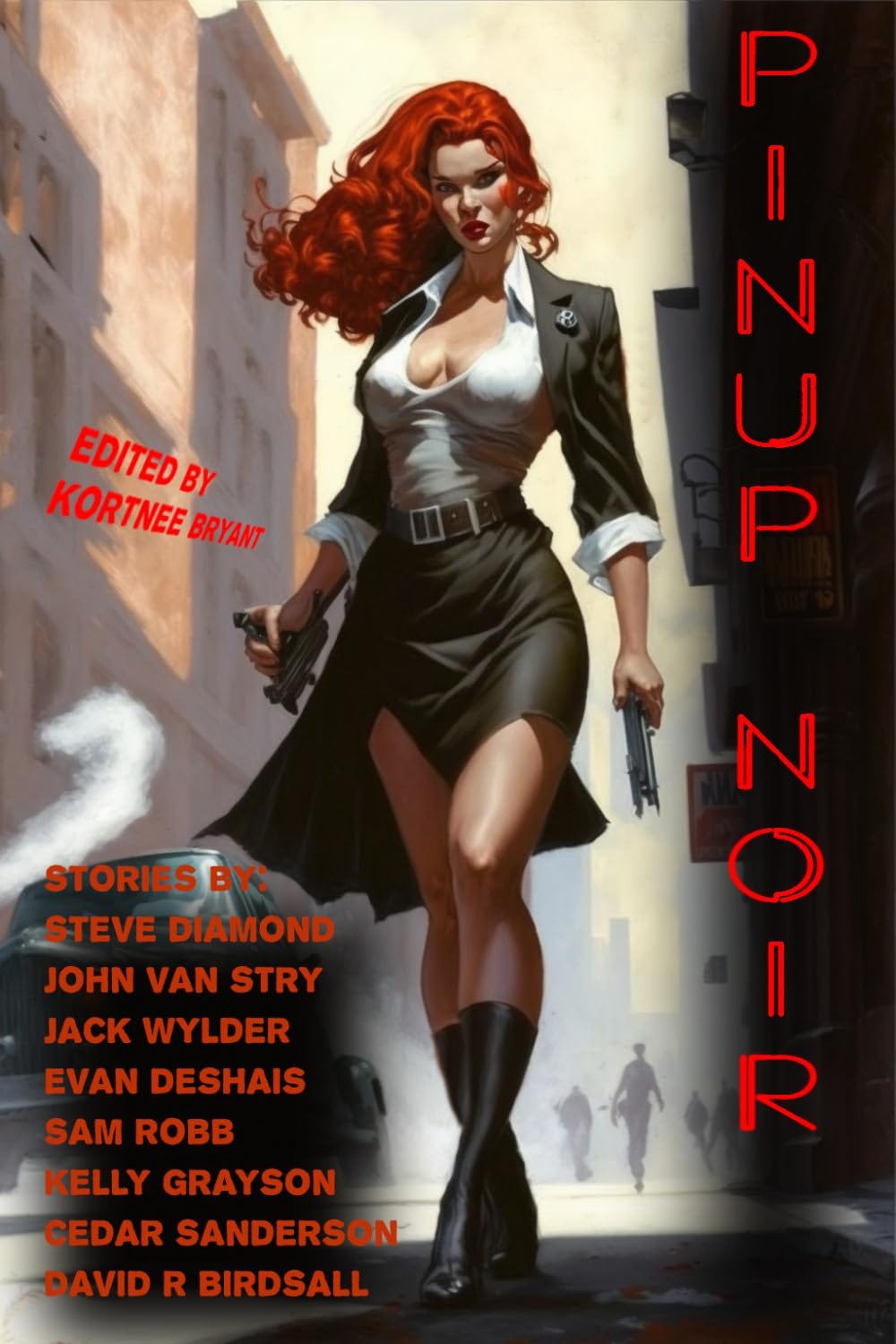A Villain, By Any Other Name...
You can't spell "The Villain" without "Evil".
And I say, Zangief, you are a bad guy, but this does not mean you are “bad guy.”
—Wreck-it Ralph
Ooooooooh. Over in the WriterDojo facebook group,
asked “What makes a great villain?”As you can imagine, I Have Opinions.
Let’s start with some definitions.
What’s a villain? “A wicked or evil person; a scoundrel.” Wikipedia expands upon that, adding, “… a character in a play, novel, or the like, who constitutes an important evil agency in the plot… often defined by their acts of selfishness, evilness, arrogance, cruelty, and cunning, displaying immoral behavior that can oppose or pervert justice.”
Then we have antagonist: “The principal character in opposition to the protagonist or hero of a narrative or drama.” Wikipedia states, “An antagonist is a character in a story who is presented as the main enemy or rival of the protagonist and is often depicted as a villain.”
That last one is where I want to hang my hat. It’s entirely possible for a protagonist to face opposition that falls short of being evil, and may even be respectable (more on that later).
But… there’s a certain vibe here, isn’t there? A villain is specifically evil. They’re the nasty embodiment of… well, pretty much every negative quality you can imagine. I would argue that most of those, if not all of them, stem from the first one listed: their selfishness. To the villain, they are the center of the everything. Leading naturally to the adage that, “every villain is the hero of his own story”.
Which is horrible.
Followed as presented, it all too often leads to “sympathetic villain syndrome”. Oh, our villain has trauma in their past! That explains why they act the way they do! Isn’t it so interesting to see how their past adversities have shaped them?
I get it. That’s natural. We want to understand the world around us, and even understand the opposition we face - whether it is evil or not. So trying to explain the villain is tempting; but almost everyone gets it wrong. How? They fail to see that what they are doing in trying to explain the villain is the exact same flow of logic that leads to someone being a villain in the first place.
Pick some trauma. There are plenty of heroes out there that have overcome the same adversity. Joker’s “one bad day” philosophy doesn’t hold, because everyone has bad days. Some heroes (Harry Dresden, anybody?) seem to have nothing but a string of terrible, horrible, no good, very bad days.
The difference is that the hero refuses to let those bad days justify their behavior.
That’s the difference right there. There’s a line that we know we shouldn’t cross. The difference is that a hero has what looks like an excuse to cross that line, and refuses to take it. A villain, on the other hand, grabs that excuse and holds onto it like a life preserver while they plunge across that line into the dark waters beyond.
A hero looks at what’s bad in their life, and in effect says, “Despite what happened to me, I will do my best to be a good person.” In the same situation, a villain says, “Because of what happened to me, I don’t have to be a good person.”
Despite vs. Because. Selfless vs. Selfish. Self-restraint vs. Self-justification.
These are two very different reactions to adversity. Unless you are very careful, working from the idea that “every villain is the hero of his own story” leads you down a path where you are trying - one way or another - to justify the villain’s actions…
… which is exactly what a villain does.
This is so fundamental that I think part of a great story is taking a hero and a villain who have similar backgrounds and showing how that story plays out. One bad day turned Joker into a killer. One bad day turned Batman and Spider-Man into heroes.
Speaking of Spider-Man: he has some amazing villains because hey, you know what? The difference between Despite and Because, the choice between Selfless and Selfish, isn’t a one-time thing. Watching Spidey sit down with Sandman and talk about life and choices and the whys of their different paths in life is fascinating. Largely because Peter Parker is a genuinely good guy. In a very real sense he holds up a mirror to his opponents and shows them what they could have become, if they’d made a different choice; then he reminds them that every day is the opportunity to make that decision.
As a hero, Peter challenges the “one bad day” idea by reminding his enemies that they have the opportunity to make this a good day… and some of them do. Those who reject that, and embrace their selfish justifications? They are true villains. They know what they are doing, they know the line they have crossed, and they embrace it.
Which is why I reject the idea that a villain is the “hero” in their own story. An actual villain knows that they are in the wrong, and they don’t care. If they are the “hero” in their own story, that’s only a means to an end. It might be a lie they tell others, or even tell themselves— but it is a lie, and it’s there to help them justify what they know is wrong.
If you’ve read my story “Down Among the Dead Men” (available from from Pinup Noir) Drosser is exactly the type of character I’m describing. He’s a literal Nazi who managed to end up as Satan’s hound in purgatory through sheer dint of being nastier than the last guy who had the job. He is evil, wicked, and cruel because that is what he has chosen to be, over and over again.
Now that is an excellent villain, if I do say so myself.
The Business of Writing
A mid-week update on my three major commitments: to write, to edit, and to read.
I’ve done a little bit of work on the short stories I’ve got in the hopper, but not a whole lot. Instead, I’ve engaged in some reading. Specifically, working on critiques for my writing group, the Alpha Mercs, as well as a few other friends. It’s strange, bouncing from post-apoc battle fiction to sword & sorcery to space truckers, but at least there’s never a boring moment.
One of the stories I’m working on is a bit of backstory for one of the characters from Blue as Sky. It’s a little strange, because I think think this is honestly the first time I have written a second story with the same characters. Well, one of the same characters. I spent an hour or so digging through BAS to make sure that I wasn’t contradicting anything that I’d already said.
I think I may have to return to this setting, though. It’s strange and eerie, a dead world where the battle between Heaven and Hell has literally boiled off the 80% of the world’s seas. Men persist, downslope where there’s still waters to sail, and enough moisture to keep life going; but our protagonist picks out a living upslope, looting magic and technology from the ruins of a world that no longer exists.
No, this isn’t Kellan’s world. That’s part of the fun of playing in a multiverse. There’s a million worlds out there, and I get to imagine what they’re all like. 😎
Other Stuff
We are emerging from illness. Yay! And there was much rejoicing.
Other than that, it’s been relatively calm around the household. The new-ish hound is settling in, and no longer feels the need to go into a barking frenzy every time she goes outside. The cats are all generally fat, lazy, and happy. There’s been time to work, time to play, and time to go for walks - and even if they are short and chilly, they sun is staying out a little longer each day, which is a relief.
Hunker down, stay warm, and I’ll see you all next week.






I've always disliked villain origin stories, for two reasons that I don't think I ever crystallized. One is the general darkness of the theme. Villains are almost exclusively born in darkness, except for a few exceptions in which they are the darkness born into light. Which is where we encounter your point, I think, and my second reason. It's easy to portray a villain with a difficult past. But the writer who successfully portrays a villain as someone who should have known better and done better... *That* is the writer who makes the audience properly despise the villain, and secretly teaches the children what we want them to learn along the way.
Of course, I think I like even more the antagonist who is a proper good guy. It's probably a hard plot to generate. Which now makes me wonder if Inigo Montoya qualifies; a point on which I've reversed position several times in 30 seconds. Maybe it's time for bed.
great article, Sam!